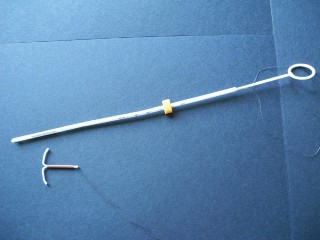Fundamentals of Midwifery: A Textbook for Students (116 page)
Read Fundamentals of Midwifery: A Textbook for Students Online
Authors: Louise Lewis

BOOK: Fundamentals of Midwifery: A Textbook for Students
9.66Mb size Format: txt, pdf, ePub
276

Figure 12.9
IUS and introducer.
with little or no supplementation. As with all methods the woman has a right to make an informed choice.
Emergency contraception
This method is used to help prevent an unwanted pregnancy if a contraceptive method fails or if no contraception is used. It needs to be given as soon as possible after unprotected sex or a failure of a contraceptive method. Emergency contraception should only be used as an occa- sional method and does not prevent a pregnancy every time it is taken. It can be obtained from pharmacies and outpatients departments in hospitals. Some accident and emergency and minor injury departments may also provide this service. There are two types: emergency con- traception pills, which are thought to work by inhibiting or delaying ovulation; and an IUD, which reduces the viability of the ovum and the ability of the sperm to fertilise the ovum. If the IUD is inserted after fertilisation has occurred, then it is thought that it acts by inhibiting implan- tation. However, this process is not fully understood.
Sterilisation
Male sterilisation – vasectomy
Vasectomy is when the vas deferens that carry sperm from the testicles to the penis are cut, sealed or blocked. This procedure is usually done under local anaesthetic and can be done as an outpatient, or some GP practices provide this service. Male sterilisation is not effective imme- diately and semen tests need to be carried out as some sperm can remain in the tubal area for some time. It cannot be considered to be effective until the semen test is proven negative which can take up to 8 weeks. It is 99% effective and considered as a permanent method of contracep- tion and cannot be easily reversed. There needs to be careful counselling before the decision to have a vasectomy is made as requests for reversal are becoming more frequent; due to the financial restraints on local health services these requests are not always available and can be expensive to obtain privately.
Female sterilisation
The uterine tubes are cut, sealed or blocked by an operation. This prevents the egg and sperm meeting and therefore fertilisation. The procedure is carried out by laparoscopy or in some cases mini-laparotomy. Usually a general anaesthetic is used or on occasions a local anaesthetic may be considered. Sterilisation is rarely considered at the time of Caesarean section any more, due to the fact that it has an increased failure rate when done at this time. Alternatives to sterilisa- tion, such as long-acting methods, are often offered as this is preferable to a surgical procedure. It is also not advised for younger women as many regret their decision to have sterilisation, particularly if they start a new relationship. Reversal is not always possible or successful.
Further advice and treatment
An important element of the provision of contraception and family planning advice is informa-
tion about where to seek further advice and treatment. A common approach to this is to recom- mend that the woman sees her GP; however this is not always the best source of advice as in many GP practices this role is carried out by a specialist nurse rather than the doctor, and trying to see the GP can delay access to contraception. Centres for Sexual Health also provide family planning services and have the advantage that they can also provide sexual health screening at the same time if required.
It may be appropriate to offer some women advice about where they can seek credible web-based information about family planning and contraception. The Family Planning Associa- tion have long been an organisation that has provided information, advice and treatment for women in relation to contraception and sexual health. Their website can be found at www.fpa.org.uk
, and this has plenty of user-friendly information including a confidential hel- pline number and the addresses of the nearest clinics. The Brook organisation is also a useful source of information and advice particularly for younger women; their website is available at www.brook.org.uk

277

Key points
Family planning is not just about preventing future pregnancy; it is also about spacing and plan-
 ning for future children.
ning for future children.

 ning for future children.
ning for future children.
Family planning advice needs to be individualised and sensitive to women’s needs and given
 without judgement or assumptions.
without judgement or assumptions.


 without judgement or assumptions.
without judgement or assumptions.

Knowledge of both contraceptive methods and local services is essential to the provision of
 effective care.
effective care.
Conclusion
This chapter has provided an overview of the topic of contraception and family planning. Sensi-tive communication is essential to effective care in this area as discussions must allow for privacy and confidentiality whilst eliciting sufficient information to enable the midwife to provide appropriate and individualised advice. Midwives should have a working knowledge of available contraceptive methods as early advice is central to avoiding unplanned, and sometimes unwanted, pregnancies; they should also know where to direct women for further advice and treatment.Midwives may find giving advice or discussing sex and sexual health difficult as it is a very intimate and sensitive subject for them as well as for the women in their care. It is important that midwives have a good knowledge of contraceptive methods and of the issues that concern women, but it is also essential that any personal embarrassment is put aside to ensure that women are provided with appropriate advice and information. Recognising this as a part of midwifery care that can make a real difference to women and their health is helpful in this regard. Midwives have a unique relationship with women and this provides them with an opportunity to be able to discuss very personal issues.
End of chapter activities
Crossword

 123456789278
123456789278
Across
1.
This is essential when taking oral contraception
 effective care.
effective care.Conclusion
This chapter has provided an overview of the topic of contraception and family planning. Sensi-tive communication is essential to effective care in this area as discussions must allow for privacy and confidentiality whilst eliciting sufficient information to enable the midwife to provide appropriate and individualised advice. Midwives should have a working knowledge of available contraceptive methods as early advice is central to avoiding unplanned, and sometimes unwanted, pregnancies; they should also know where to direct women for further advice and treatment.Midwives may find giving advice or discussing sex and sexual health difficult as it is a very intimate and sensitive subject for them as well as for the women in their care. It is important that midwives have a good knowledge of contraceptive methods and of the issues that concern women, but it is also essential that any personal embarrassment is put aside to ensure that women are provided with appropriate advice and information. Recognising this as a part of midwifery care that can make a real difference to women and their health is helpful in this regard. Midwives have a unique relationship with women and this provides them with an opportunity to be able to discuss very personal issues.
End of chapter activities
Crossword

 123456789278
123456789278Across
1.
This is essential when taking oral contraception
Other books
Horse Care by Bonnie Bryant
Blue Eyes by Jerome Charyn
Home Sweet Home by Lizzie Lane
The Swordsman of Mars by Otis Adelbert Kline
What Remains of the Fair Simonetta by Laura T. Emery
The Death and Life of Gabriel Phillips by Stephen Baldwin, Mark Tabb
Clementine Rose and the Special Promise 11 by Jacqueline Harvey
The President's Vampire by Farnsworth| Christopher
A Covenant with Death by Stephen Becker
the Lonesome Gods (1983) by L'amour, Louis